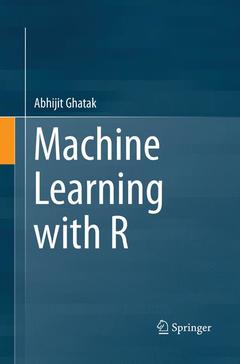Description
Machine Learning with R, Softcover reprint of the original 1st ed. 2017
Author: Ghatak Abhijit
Language: English
Subject for Machine Learning with R:
Approximative price 60.12 €
In Print (Delivery period: 15 days).
Add to cartPublication date: 12-2018
Support: Print on demand
Approximative price 84.39 €
In Print (Delivery period: 15 days).
Add to cartPublication date: 12-2017
Support: Print on demand
Description
/li>Contents
/li>Biography
/li>Comment
/li>
This book helps readers understand the mathematics of machine learning, and apply them in different situations. It is divided into two basic parts, the first of which introduces readers to the theory of linear algebra, probability, and data distributions and it?s applications to machine learning. It also includes a detailed introduction to the concepts and constraints of machine learning and what is involved in designing a learning algorithm. This part helps readers understand the mathematical and statistical aspects of machine learning.
In turn, the second part discusses the algorithms used in supervised and unsupervised learning. It works out each learning algorithm mathematically and encodes it in R to produce customized learning applications. In the process, it touches upon the specifics of each algorithm and the science behind its formulation.
The book includes a wealth of worked-out examples along with R codes. It explains the code for each algorithm, and readers can modify the code to suit their own needs. The book will be of interest to all researchers who intend to use R for machine learning, and those who are interested in the practical aspects of implementing learning algorithms for data analysis. Further, it will be particularly useful and informative for anyone who has struggled to relate the concepts of mathematics and statistics to machine learning.
Chapter 1. Linear Algebra, Numerical Optimization and it’s Applications in Machine Learning.- Chapter 2. Probability and Distributions.- Chapter 3.Introduction to Machine Learning.- Chapter 4. Regression.- Chapter 5. Classification.- Chapter 6. Clustering.
Abhijit Ghatak is a Data Scientist and holds an ME in Engineering and MS in Data Science from Stevens Institute of Technology, USA. He started his career as a submarine engineer officer in the Indian Navy and worked on multiple data-intensive projects involving submarine operations and construction. He has worked in academia, technology companies and as a research scientist in the area of Internet of Things (IoT) and pattern recognition for the European Union (EU). He has published in the areas of engineering and machine learning and is presently a consultant in the area of pattern recognition and data analytics. His areas of research include IoT, stream analytics and design of deep learning systems.
Help readers understand the mathematical interpretation of learning algorithms
Teach the basics of linear algebra, probability, and data distributions and how they are essential in formulating a learning algorithm
Help readers construct and modify their own learning algorithms, such as ridge and lasso regression, decision trees, boosted trees, k-nearest neighbors, etc
Includes supplementary material: sn.pub/extras



